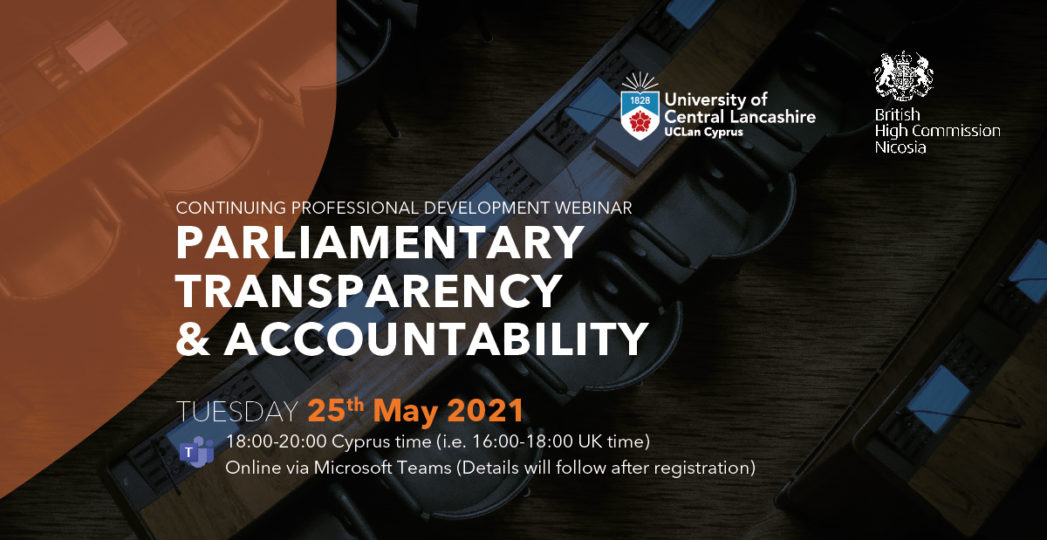On 25 May 2021, the School of Law of the Cyprus Campus of the University of Central Lancashire (UCLan Cyprus) was honoured to host a Continuing Professional Development (CPD) Webinar entitled ‘Parliamentary Transparency and Accountability’. This was the second of a series of free transparency-related Webinars organised by the School of Law of UCLan Cyprus, in association with the British High Commission in Nicosia.
The first Webinar, which was held on 31 March 2021, was entitled ‘Open Justice, Transparency and the Judiciary’ and the keynote speaker was Sir Robin Knowles, a Judge of the High Court of Justice of England and Wales. (https://www.uclancyprus.ac.cy/wp-content/uploads/2021/03/CDP_Webinar_Transparency_FINAL.pdf )
The series has been organised in the light of the coming into force, on 22 December 2020, of landmark new legislation in the Republic of Cyprus – the Law on the Right of Access to Public Sector Information 2017 (Ο περί του Δικαιώματος Πρόσβασης σε Πληροφορίες του Δημοσίου Τομέα Νόμος του 2017) which is available in Greek on the Cylaw website of the Cyprus Bar Association at www.cylaw.org/nomoi/enop/non-ind/2017_1_184/full.html
With the new legislation in mind, the general aim of the series is to promote greater public awareness of what is meant by transparency, open justice, access to public sector information and related principles. A related aim is to reflect upon the British experience of applying these principles in practice.
The second Webinar of the series began with an Introduction by Professor Stéphanie Laulhé Shaelou, Professor of European Law & Reform and Head of the School of Law of UCLan Cyprus. She set the scene in the wider framework of the rule of law and its upholding in Europe.
Professor Laulhé Shaelou placed particular emphasis on key indicators of parliamentary transparency, accountability and democratic oversight in the Republic of Cyprus, as reported, firstly, in the newly established European Rule of Law Mechanism of the European Commission. She noted, in particular, that bills of essence to the rule of law remain pending before the House of Representatives. At the European level, Professor Laulhé Shaelou referred, secondly, to the latest evaluation round of the Council of Europe’s Group of States against Corruption (GRECO) that assessed the implementation of a series of recommendations pertaining to the legislative branch of power. To these recommendations, she noted, must be added the visceral need for democratic oversight in any modern State, as exercised by its parliament or parliaments.
Mindful of the then run up to the parliamentary elections in the Republic of Cyprus on 30 May 2021 and the ongoing pandemic, Prof. Laulhé Shaelou suggested that transparency and accountability to the wider society have become more fundamental than ever. If both principles are applied properly, they may prevent illegalities and help to protect the democratic process for which the parliament is co-responsible.
In an effort to highlight the issues at stake in the Republic of Cyprus, Prof. Laulhé Shaelou explained that, prior to the parliamentary elections, she had been consulted as an expert in the Elections Rule of Law series on Cyprus (details of which are at https://democracy-reporting.org/dri_publications/cyprus-elections-and-the-rule-of-law/).
The Introduction of the Head of School was followed by some Opening Remarks by Ben Rawlings, Deputy British High Commissioner to Cyprus, who underlined the importance the UK attaches to promoting transparency across the globe as part of its wider Anti-Corruption Strategy. Mr Rawlings also highlighted the already strong collaboration that exists between the UK and Republic of Cyprus legislative branches, especially in light of our shared values across the Commonwealth, democracy and rule of law.
The next to address the audience was the Keynote Speaker – Saira Salimi, Speaker’s Counsel in the House of Commons of the Parliament of the United Kingdom. Ms Salimi delivered a compact analysis of the origins, evolution and contemporary character of Parliamentary transparency and accountability, as applied by the Parliament of the United Kingdom. She paid particular attention to a number of issues. These included the statutory and common law context vis-à-vis freedom of information, the impact of data protection law and the nature of parliamentary privilege.
Among the Acts of Parliament considered by Ms Salimi was the Parliamentary Standards Act 2009 (available at www.legislation.gov.uk/ukpga/2009/13/introduction). In the words of its Preamble, this Act not only ‘make[s] provision establishing a body corporate known as the Independent Parliamentary Standards Authority and an officer known as the Commissioner for Parliamentary Investigations’. It also ‘make[s] provision relating to salaries and allowances for members of the House of Commons and to their financial interests and conduct; and for connected purposes.’
The Keynote Speech was followed by a supporting analysis by Dr Klearchos A. Kyriakides, Assistant Professor in the School of Law of UCLan Cyprus and its Deputy Head. In his capacity as Discussant at the Webinar, Dr Kyriakides presented a paper in which he identified six lessons which emerge from the politico-legal history of the United Kingdom. In so doing, he indicated that these are relevant to democracies beyond the shores of the United Kingdom.
The six lessons identified by Dr Kyriakides are listed below:
- Lesson (1): Parliamentary transparency, accountability and democracy each hinge upon a contemporaneous, authoritative and accurate official record of parliamentary proceedings coupled with other accurate parliamentary materials.
- Lesson (2): Accurate parliamentary materials are not enough to guarantee parliamentary transparency, accountability and democracy. Other mechanisms are also necessary. These include but are not limited to open access by members of the public to the public areas of the legislature, published parliamentary calls for written evidence, ‘surgeries’ arranged by each parliamentarian for the benefit of their constituents, the existence of published public registers embodying the financial interests of parliamentarians, freedom of information laws coupled with user-friendly freedom of information procedures applicable to parliaments, openly accessible parliamentary websites and openly accessible parliamentary library resources.
- Lesson (3): Subject to legitimate exceptions, Parliament must always remain open for business. Otherwise, parliamentary transparency, accountability and democracy can neither exist nor appear to exist.
- Lesson (4): Every Parliamentarian must ensure that their private life and, if they have one, their business or professional life, does not have – and does not appear to have – any adverse consequences upon either the public office that they hold or the public duties that they perform.
- Lesson (5): The truth is the lifeblood of Parliamentary transparency, accountability and democracy. The truth is also the lifeblood of justice.
- Lesson (6). Every Parliamentarian and other person holding public office must abide by The Seven Principles of Public Life. These are selflessness, integrity, objectivity, accountability, openness, honesty and leadership. (The Seven Principles of Public Life have been published and explained at gov.uk/government/publications/the-7-principles-of-public-life/the-7-principles-of-public-life–2).
The paper accompanying the presentation of Dr Kyriakides has been made freely available here.
The Webinar ended with a Question-and-Answer session.
A full video recording of the Webinar is available here: https://youtu.be/rlpshafmCow
As UCLan Cyprus, through its School of Law, is an accredited provider of CPD programmes under the relevant Cyprus Bar Association scheme, the participation in the Webinar of lawyers practising in the Republic of Cyprus was certified in accordance with the CPD requirements of the Cyprus Bar Association.
UCLan Cyprus expresses its profound gratitude to Saira Salimi, to Deputy High Commissioner Rawlings and to the colleagues of both. UCLan Cyprus also thanks the members of the legal profession, law students and members of the general public who attended the CPD Webinar held on 25 May 2021.
The flyer relating to the CPD Webinar is available here: www.uclancyprus.ac.cy/wp-content/uploads/2021/05/Parliamentary_Flyer.pdf
In the aftermath of the Webinar, two relevant developments have taken place which should not go unmentioned.
Firstly, on 10 June 2021, Ms Annita Demetriou, one of the Members of the House of Representatives of the Republic of Cyprus for Larnaca, was elected to become the President of the House. She is the first ever woman to serve in that role. Ms Demetriou is a former Recruitment and External Liaison Officer of UCLan Cyprus.
Secondly, in response to a worthy new initiative of the Supreme Court of the United Kingdom, which was unveiled on 28 April 2021, the School of Law of UCLan Cyprus recently organised an Educational Virtual Tour of the Court. This took place, via Microsoft Teams, on 22 June 2021. It was for the benefit of LLB and LLM students at UCLan Cyprus for whom admission was free.
The Tour included an overview of the history, statutory basis and constitutional role of the Supreme Court, as kindly provided by one of its Information Officers. The Tour also included an insight into the duties of the Judicial Assistants to the Justices of the Court, as kindly provided by one of these Judicial Assistants.
The School of Law of UCLan Cyprus hereby records its gratitude to the Supreme Court of the United Kingdom and to all of its members of staff who were involved in the Tour. At a time when personal visits to court buildings continue to be difficult amid the ongoing COVID-19 pandemic, the new initiative of the Supreme Court of the United Kingdom is much needed. In addition to helping students to gain a realistic – if virtual – insight into the Court, the new initiative underlines that the twin principles of open justice and transparency have tangible educational dimensions that may be facilitated by technology.
Schools, colleges and universities which are interested in organising an Educational Virtual Tour may find details on the website of the Supreme Court of the United Kingdom at www.supremecourt.uk/visits-for-schools-colleges-and-universities.html and at www.supremecourt.uk/news/supreme-court-launches-virtual-tours-for-members-of-the-public.html
Finally, it is hoped that this press release will enable the educational impact of the CPD Webinar held on 25 May 2021 to be long-lasting and not geographically confined to the Republic of Cyprus. After all, parliamentary transparency and accountability are principles of interest to parliamentarians, lawyers, law students and members of the general public wherever they may be, especially in those parts of the Commonwealth and the wider world that share the common law tradition or the Westminster model of parliamentary democracy.

A photograph of the Webinar held on 25 May 2021, as posted on Twitter by the British High Commission in Nicosia at https://twitter.com/UKinCyprus/status/1397221389535518729/photo/1 and https://twitter.com/UKinCyprus/status/1397221389535518729




